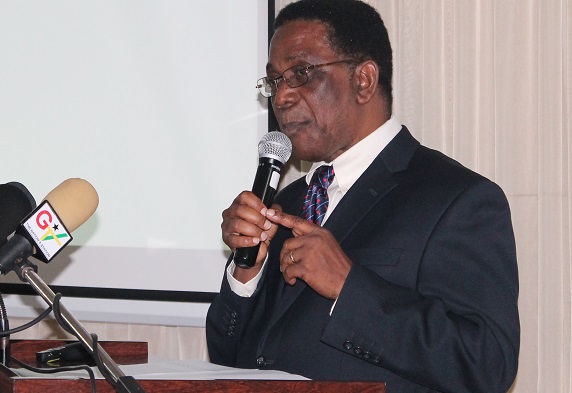
Colleges of Education reforms unique— Prof. Yankah
The Minister of State in charge of Tertiary Education, Prof. Kwesi Yankah, has explained that the conversion of colleges of education into university colleges stands out as one of the most significant institutional reforms approved by Cabinet.
That, he said, was meant to harness the combined resources and expertise of designated universities and colleges of education to develop and deliver a four-year bachelor of education (B.Ed) curriculum aligned with the national teachers standard.
“The idea is to have all the existing 46 public colleges of education eventually integrated into five public universities currently offering education curriculum.
Each of the 46 colleges of education has been assigned to any of the five public universities, effective October 2019,’’ he said.
Anniversary durbar
He was speaking at the 90th anniversary durbar of the Aburi Presbyterian Women’s College of Education (PWCE) at Aburi in the Eastern Region, last weekend.
The celebration, which started last year, was climaxed with a durbar on the theme: ‘’90 Years of Female Teachers: Acknowledging the past, celebrating today, Planning for the Future’’.
The programme was well attended by distinguished guests, present and old students, as well as Ghanaian Principals who headed the college and principals of sister colleges.
Prof. Yankah mentioned that some reforms by the government, such as the operationalisation of the National Teacher Standards as a prerequisite for the assessment of pre-service teachers, implementation of the National Teacher Education Curriculum framework, conversion of colleges of education to selected public universities, and the introduction of a new four-year university of education programme, are four key pillars of education which were crucial to the present and the future development of education.
Special affiliation agreements
He added that special affiliation agreements were to be signed between the universities and the respective colleges of education, for the implementation of the B. Ed curriculum through the five universities.
Prof. Yankah encouraged tutors and teacher trainees to pay attention to the gender and inclusion component of their work, bearing in mind the gender sensitive nature of their institutions.
“I would indeed charge you to become leaders and champions of gender and inclusion in the educational system,” he stressed.
Prof. Yankah re-emphasised government’s commitment to provide teachers with quality tools needed to push the agenda for quality education, and explained that currently negotiations were ongoing between Colleges of Education Teachers Association of Ghana (CETAG) and the Fair Wages and Salaries Commission, in relation to the welfare of teachers, explaining that when concluded, the negotiations would enhance the package of CETAG members.
Commendation
Prof. Yankah commended the Presbyterian Church of Ghana (PCG) for its role in training and nurturing the girl-child from the basic to the tertiary levels of education, with a good sense of discipline and good morals.
He said institutions like the PWCE and others which Ghana was proud of, had an intangible quality that made them stand out, referring to the values of integrity and self-discipline that made such schools resilient, founded on sound Christian and moral principles.
Prof. Yankah assured the gathering that the Governing Councils of Colleges of Education had been formed and their respective inaugurations would begin in due course.
He used the occasion to inauguate a GETFund Library Project for the college.
In his address, the Moderator of the Presbyterian Church of Ghana (PCG), Rt. Rev. Professor Joseph Obiri Yeboah Mante, commended the authorities of the PWCE for maintaining high level of discipline in the training of many female teachers, who were holding many positions of trust including the current Principal of the college, Dr Mrs Harriet Naki Amui, adding that the PCG would not compromise on discipline in schools in the country.
He said the Presbyterian schools were established with the strong conviction that good discipline and good morals were the major ingredients for any good education and for any strong society, adding that “we as a church do not want to lose that conviction and ethos under the guise of any form of modern education”.
The Moderator said the church wanted all Presbyterian schools to exhibit a strong sense of good morals and good discipline in such areas as the way the students and staff dressed, respect for authority, and respect for all manner of persons irrespective of the age and sex.
He said the church was not ready to compromise on its values of good discipline and good morals in the schools.
College history
Dr Mrs Harriet Naki Amui in her report said the college, which metamorphosed in 1928 from a Presbyterian Boarding School into a Presbyterian Teacher Training College with only two students under Ms Elsie Mackillican, the Scottish Missionary, currently had a population of 714 students.
The principal lamented that the college’s Science and Home Economics laboratory and their equipment were outdated.
She said moving on in a new direction with the focus on Technical and Vocational Education and Training (TVET), the construction of a befitting Science and Home Economics Block for the college would enhance academic work.
The guest of honour, Dr Mrs Esther Offei Aboagye, an old tutor of the college, said looking into the future, PWCE, like other colleges, had to continue to be innovative to respond to the changing needs of the nation.
